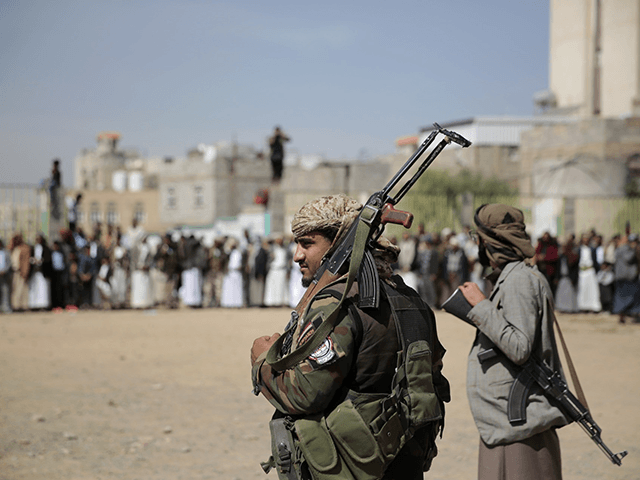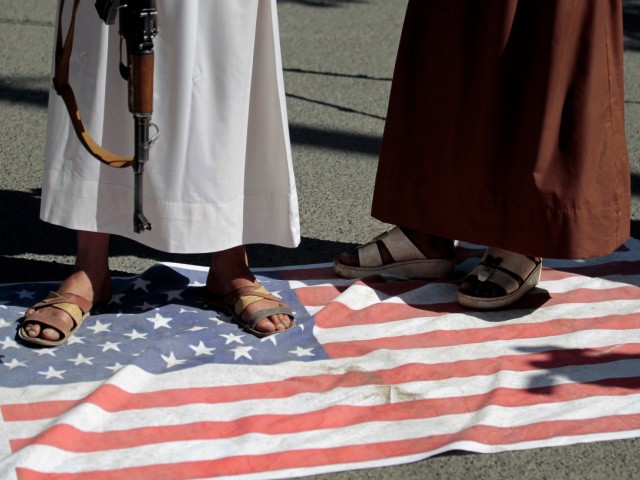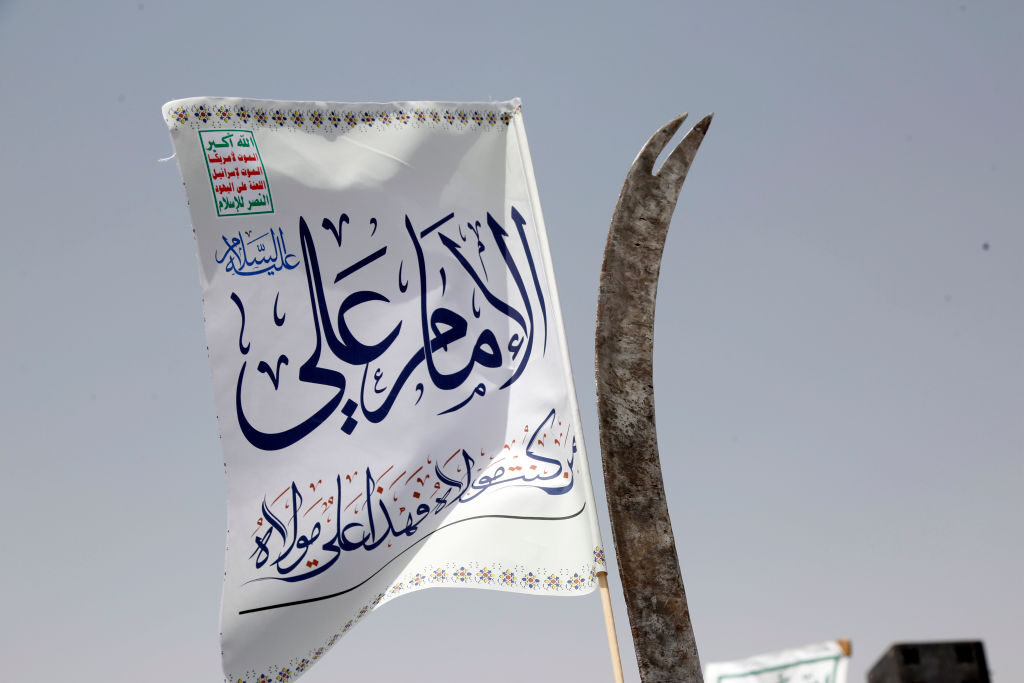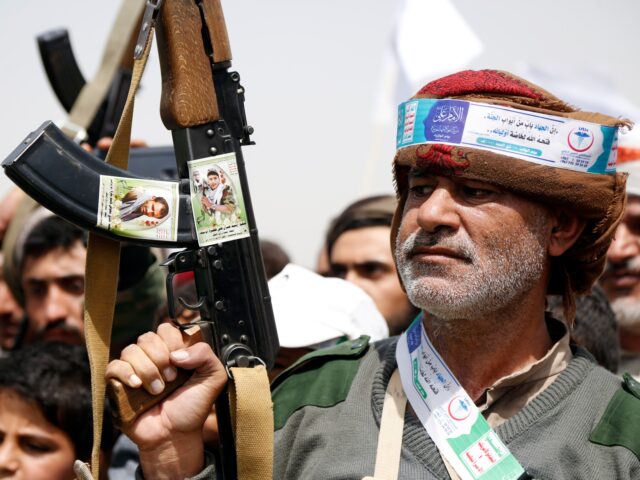The Biden Administration rebuffed calls from human rights activists and congressional leaders on Monday by refusing to restore the murderous Iran-backed Houthi insurgents of Yemen to the list of foreign terrorist organizations.
“Humanitarian considerations continue to be an important factor in any decision regarding a Foreign Terrorist Designation of Ansar Allah. We are currently focused on securing, extending, and building on the United Nations truce in Yemen, which is having a tangible impact on millions of Yemenis and provides a credible opportunity for peace in Yemen,” a State Department spokesperson said on Monday.
President Joe Biden delisted the Houthis as one of his first acts in office. The insurgents have engaged in constant acts of terrorism and escalating violence ever since.
Secretary of State Antony Blinken announced the revocation of the Houthis’ terrorist designation on February 12, 2021. He referred to the insurgents by their preferred name, Ansar Allah or “Army of Allah.” The official slogan of the Shiite Islamist group is “Allah is great, death to the United States, death to Israel, curse the Jews, victory for Islam.”
Blinken claimed the decision to give the Houthis a clean bill of terrorism health was made because continuing to list them as terrorists would interfere with humanitarian efforts in Yemen.
“We have listened to warnings from the United Nations, humanitarian groups, and bipartisan members of Congress, among others, that the designations could have a devastating impact on Yemenis’ access to basic commodities like food and fuel,” Blinken said in February 2021.
The Houthis overthrew the internationally-recognized elected government of Yemen in 2015, fracturing the country into what eventually became a three-way civil war, thanks to a breakaway southern separatist movement. The Houthi takeover unleashed what is arguably the worst humanitarian crisis in the world, including huge numbers of displaced people suffering from starvation and disease.
The vicious Houthi insurgency received heavy political, financial, and military support from Iran, the world’s worst sponsor of international terrorism. A fresh shipment of Iranian missiles bound for Yemen was seized by the British Royal Navy less than three weeks ago.

Armed Houthi fighters attend the funeral procession of Houthi rebel fighters who were killed in recent fighting with forces of Yemen’s internationally recognized government, in Sanaa, Yemen, on Nov. 24, 2021. (AP Photo/Hani Mohammed, File)
Blinken vowed to “closely monitor the activities of Ansar Allah and its leaders,” several of whom remained under individual sanctions as threats to the “peace, security, or stability of Yemen.”
It would be more accurate to say the Biden administration studiously ignored incessant Houthi provocations after the group pocketed President Joe Biden’s unilateral concessions. In fact, Blinken admitted on the very day he lifted the terrorist designation that Houthi forces were still launching “explosive boat attacks against commercial shipping in the Red Sea and UAV and missile attacks into Saudi Arabia.”
The Houthis launched a series of damaging drone attacks on Saudi civilian targets in the spring of this year, on one memorable occasion causing a huge explosion at an oil tank facility in Jeddah that could be clearly seen from the F1 auto racing Grand Prix that was getting underway at the time.
The Saudis warned in late March 2022 that continuing Houthi terrorist attacks could compromise the kingdom’s ability to “supply the world with the necessary energy requirements.”
The Washington, D.C. embassy of the United Arab Emirates (UAE), a partner in the Saudi-led military intervention against the Houthi insurgency, argued in March that the Houthis “make the case themselves” that they are terrorists, through their words and deeds.
The UAE cited the specific criteria under U.S. law that should earn a Foreign Terrorist Organization (FTO) designation for Ansar Allah, noting that Americans have been targets of several of their terrorist actions since 2021, including a Houthi raid on the U.S. Embassy in Yemen.
“They indiscriminately deploy landmines, shell innocent communities, and recruit child soldiers. The Houthis bombed Aden’s international airport, killing civilians including humanitarian workers. Their missiles and drones target population centers and critical infrastructure. Their intent to commit future terrorist acts is clear,” the Emiratis pointed out.
The UAE noted that its own civilian sites have been targeted by Houthi drones and missiles, as well as Saudi Arabia’s, and the carnage would have been far worse if U.S. and local air defenses had not intercepted so many of the deadly attacks.
In January of this year, a coalition of human rights groups published a report that documented the Houthis are still using child soldiers, despite explicit promises to the United Nations to discontinue the odious practice. International monitors have seen children as young as seven serving as Houthi troops. Houthi officials responded to the report by insisting boys become “true men” who should “defend the Islamic nation” at the age of ten.
The child soldier report noted that one of the Houthi recruiting tools involves blocking humanitarian aid to Yemen families unless they surrender their children to Ansar Allah. This practice clearly rebukes one of the Biden administration’s stated reasons for delisting the Houthis as terrorists.
Biden administration officials have privately – and sometimes even publicly – expressed frustration with the Houthis’ refusal to stop attacking civilian targets. Children have been killed in some of these attacks, including a March 2021 missile strike that targeted a school.
Biden himself claimed in January that relisting the Houthis was “under consideration,” an evidently false statement prompted by the Houthis murdering three people in a drone strike on the UAE several days earlier.
In February, a group of 17 lawmakers wrote to the White House urging President Biden to relist the Houthis as terrorists. The letter noted that Biden’s concessions have “done little outside of embolden the Houthis to escalate their attacks and block reconciliation efforts in the country.”

Houthi supporters step and walk on a representation of the U.S. flag during a demonstration outside the closed U.S. embassy against the United States over its decision to designate the Houthis a foreign terrorist organisation in Sanaa, Yemen, Monday, Jan. 18, 2021. (AP Photo/Hani Mohammed)
A coalition of Yemeni human rights activists visited D.C. last week to urge the Biden administration to relist the Houthis as terrorists. The group met with State Department officials and members of Congress to press its case. They also delivered a letter to the White House signed by 35 human rights organizations, urging the Biden administration to hold the Houthis accountable for their actions.
“We had very positive meetings regarding our vision of how to distribute and deliver humanitarian aid without the help of the Houthis. We came away with the impression that many people, especially in Congress, think that it’s a war between the Saudi-led Arab coalition against the Houthis, which is not true,” said Mael Msalmi, a delegate from the Yemeni Coalition of Independent Women.
Another member of the delegation, human rights attorney Irina Tsukerman, sadly mused that “the agenda we are pushing is not likely to happen in the near future,” because the Biden administration “holds out hope on the prospect of extending the truce in early August,” and also still fears the Houthis would increase their interference with humanitarian aid if they were redesignated.
The truce Tsukerman referred to was brokered by the United Nations in April, after the Houthis launched a major offensive against the legitimate Yemeni government. The truce was extended for two months at the beginning of June. U.N. officials argued the truce brought tangible benefits to the long-suffering Yemeni people, including reduced civilian casualties, improved fuel deliveries, and the resumption of commercial air traffic from the capital city of Sana’a.
The Biden State Department said on Monday that it did not consider restoring the Houthi terrorist designation to be a priority, in part because such action could disrupt the U.N.-brokered truce.
The human rights delegation in Washington responded that the Houthis are already violating the truce, and pretending they are not terrorists has not improved their behavior over the past year and a half.

Yemenis who are supporting the Houthi group, hold up flags colored with the name of Imam Ali, while participating in a celebration held to mark Eid Al-Ghadir, the event celebrated to commemorate the day which Prophet Mohammed designated Imam Ali, the prophet’s son-in-law, as his successor, on July 17, 2022. (Mohammed Hamoud/Getty)
“There is no indication that withdrawing the FTO designation led to the U.N.-negotiated truce, which happened well after the sanction removal in early 2021, nor that restoring that sanction would end that truce,” noted former State Department official Gabriel Noronha. “That’s called gaslighting.”
Noronha, a persistent critic of the Iran nuclear deal, has suggested another reason for the Biden administration’s indulgence of Houthi terrorism is Biden’s desire to please Iran and revive the deal.
“We’ll allow you to conduct terrorism wherever you want; we’ll allow you to trade wherever you want; we’ll allow you to buy weapons from Russia and China, and sell them to the Houthis in Yemen, to Hezbollah and Hamas – wherever you want,” he said of Biden’s posture toward Tehran in an April interview.
The Houthis themselves declared on Sunday that they will not extend the U.N. truce any further, because they are angry at President Joe Biden for visiting their enemy, Saudi Arabia. In fact, the Houthis said all truces with the legitimate Yemeni government have been “a frustrating experience that cannot be repeated in the future.”

COMMENTS
Please let us know if you're having issues with commenting.